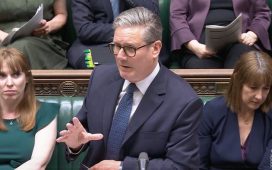Stay informed with free updates
Simply sign up to the Renewable energy myFT Digest — delivered directly to your inbox.
The UK’s largest electricity generator has urged the government to boost the budget for supporting new offshore wind projects if it wants to meet its stretching targets for decarbonising the electricity system.
Tom Glover, UK country chair for RWE, said ministers risk securing “less than half” of the new capacity needed, in the latest annual auction round for state support contracts.
“We would urge them to increase [the budget] significantly and ensure they’re getting all the advice of all the relevant experts to work out how to do that,” he added.
The lobbying from RWE and others marks a test for the new Labour government as it seeks to show it is serious about meeting its ambitious climate goals, and avoid repeating a flopped auction round last year.
A Labour spokesman said Ed Miliband, the secretary of state, would “carefully consider” whether to increase the budget after assessing the applications it has received.
It comes as the new government has taken several steps within a week of taking office to push forward its energy strategy, including allocating £7.3bn of funding to help build ports, gigafactories and other infrastructure, and easing planning rules for onshore wind projects in England.
It hopes that such measures will unleash investment from private sector companies such as RWE, which aims to invest about €8bn in Britain between now and 2030, on top of the €3bn it has invested since 2021.
Labour wants to quadruple the UK’s offshore wind capacity by 2030 as part of its plan to cut emissions from the electricity sector to net zero by then.
Offshore wind has been a success for the UK, supplying about 17 per cent of its electricity in 2023. It is second only to China in terms of installed capacity.
But the sector ran into difficulties last year owing to the rising costs of goods and financing. No offshore wind developers bid for UK state support contracts, known as contracts for difference, arguing the support on offer was too low.
Last year the Conservative government increased for this year’s auction round both the maximum electricity price the state is prepared to guarantee developers, and the total budget.
The budget does not determine how much developers will actually receive in state support, which will depend on unpredictable future wholesale prices.
Instead, it is an estimate of how much could be paid out under the contracts each year, used in the auction to restrict how many projects can be awarded contracts.
RWE and others argue the current budget of £800mn will not be enough to secure the vast numbers of new offshore wind turbines needed, given the government’s estimates on wholesale prices which it believes are flawed.
RenewableUK, the trade group, has said the government should raise the budget for offshore wind to £1.5bn to “increase investment in shovel-ready projects”.
A spokesman for the Department for Energy Security and Net Zero said applications for the auction round were “currently being assessed and the secretary of state will then carefully consider whether to increase the budget”.
He added: “Investing in clean power will cut bills and make Britain energy independent, which is why we will double onshore wind, treble solar and quadruple offshore wind by 2030.”
Climate Capital

Where climate change meets business, markets and politics. Explore the FT’s coverage here.
Are you curious about the FT’s environmental sustainability commitments? Find out more about our science-based targets here











